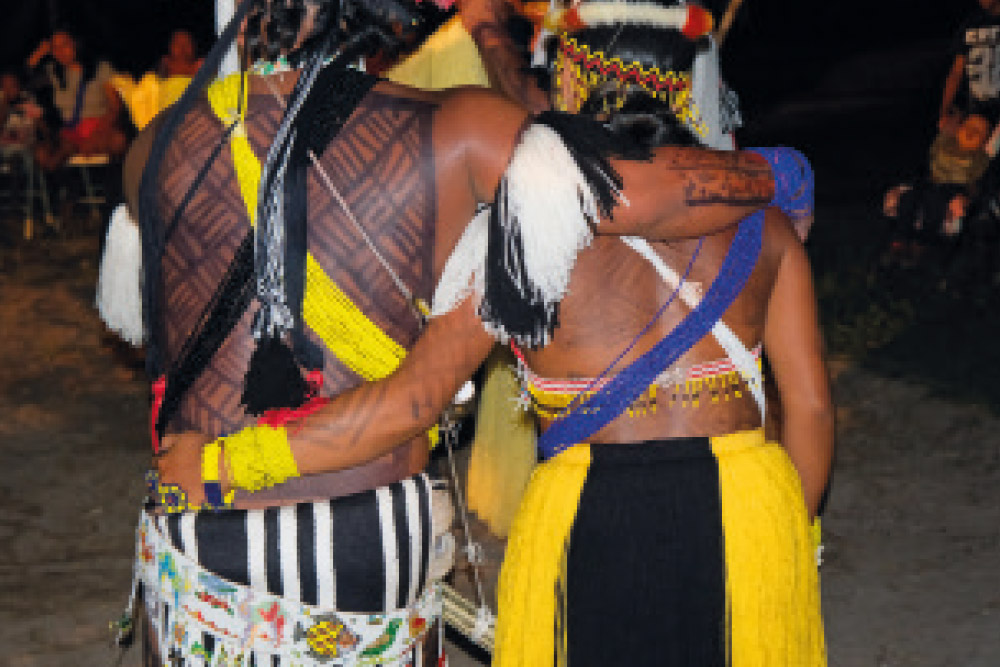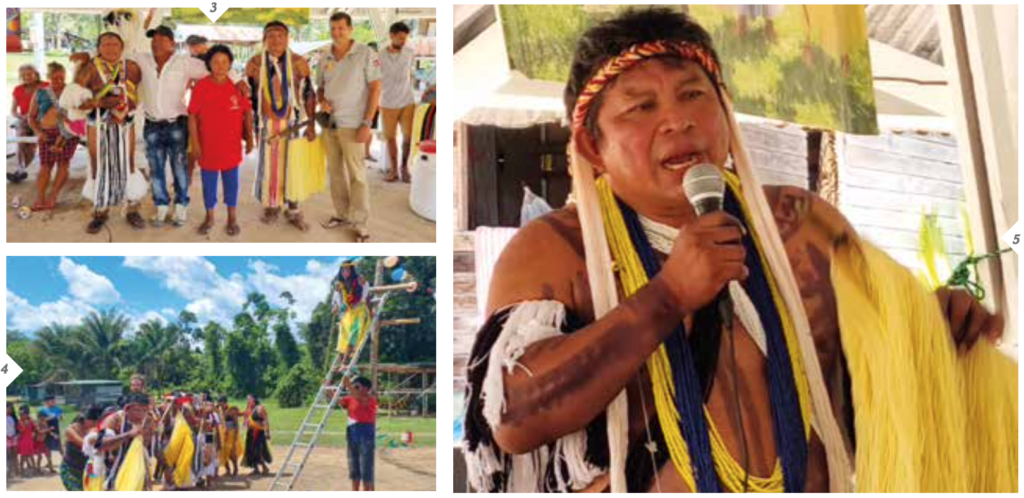
An exceptional reunion was held in early August at the Amerindian village of Kayodé: The first intercultural exchange between the Teko of Camopi (on the banks of the Oyapock River) in the east and the Teko from Haut-Maroni (along the Tampok River) in the west of French Guiana.
Légende :la nuit sera longue pour les danseurs teko.
The Teko ancestors, during their migration from the east to the west, left an indelible trail on the interior toponymy of Guiana: a trail known as the “Chemin des Emérillons.” This is how the Teko families became scattered on the Guianese land. Certain of these families gathered together at the village of Kayodé on August 4-7, 2022 for a celebration of the traditional Tadzau dance, or the dance of the peccary pig, with a dance marathon starting at approximately 6pm on Friday, August 5 and continuing until 6am Saturday morning, only to start up again at midday on Saturday for almost three more hours.

It’s an allegory of the myth about the founding of the Teko nation told through songs, music set the sound of the tule (flute), and kaway (bells attached to the feet), as well as the dance steps and clothing. This gathering was also a means of regrouping the Teko families—the only indigenous group uniquely found in Guiana, and no place else in the Americas—and to establish links between the generations and to share the Teko culture with their indigenous brothers, the Wayana/Apalaï of Haut-Maroni.
For the Teko people, dance is a means of communicating with their ancestors and their spirit animals. The event was organized by the association, Akanta, run by Jammes Panapuy, and the dance group Teko Makan, from Camopi, led by his father, Joachim Panapuy. The Panapuy family is instrumental in the protection and preservation of the traditional Teko culture.
Since the month of April, the Akanta association was able to organize ateliers to prepare for this event, which also serves as a means of sharing and transmitting a great deal of knowledge about the Camopi dance: making the traditional costumes, fabricating the musical instruments, including the “tulé,” or traditional flute. Twenty or so dancers were trained to participate in this cultural exchange at Kayodé. For the Teko people, the dance itself has undergone large changes, but is still practiced by younger generations. It also remains an essential aspect of the Teko identity.
“This exchange between the Teko of the east and the west encourages intergenerational transmission and allowed a cultural reconciliation between members of the same group separated geographically and having evolved differently based on their location. It is also a reaffirmation of the Teko identity in Guiana,” explains Jammes Panapuy, president of the association, Akanta, about an indigenous nation that was on the verge of extinction during the first half of the 20th century. The interplay of alliances between the Wayãpi people in the east and the Wayana in the west encouraged a demographic renewal of the Teko nation, increasing from approximately 50 individuals in the 1940’s-1950’s to more than 1,000 today. And for the past several years, thanks to clans like the Panapuy family, The Teko nation is enjoying a strong renaissance, following the example of other indigenous peoples in French Guiana, who are more than ever motivated to defend their rights and their culture.
August 9, International Day of the World’s Indigenous Peoples, is of major importance in French Guiana. The First Peoples gather to discuss their recurring problems: land, culture, and the recognition of their rights, while they also denounce the injustices of which they consider themselves to be victims. These revendications are certainly not new…

DICTIONNAIRE DICO TEKO (TEKO/FRANÇAIS):
https: //corporan.huma-num.f r/Lexiques/dicoTeko.html
https: //www.reseau-canope.f r/langues-et-innovations-numeriques-educatives-en-guyane/ressources-en-langues/ ressources-en-langue-teko.html
https://langues-de-guyane.ins.ac-guyane.f r/KALETA-TEKO-AWU-PANAI%CC%83TSI%CC%83-AWU-IPOPE-MA-E%CC%83- dictionnaire-teko-f rancais.html
Auteur :Jean-Maurice Montoute

